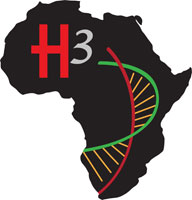NIH and Wellcome Trust fund $38M in African genomic studies
September / October 2012 | Volume 11, Issue 5
African scientists will conduct genomic research on kidney disease, diabetes, heart disease, obesity, tuberculosis and sleeping sickness through inaugural grants of the
Human Heredity and Health in Africa Consortium (H3Africa).
The NIH and
Wellcome Trust, funding partners for the project, are awarding up to $38 million over five years for the genomics research projects as well as to develop an African bioinformatics network and support two pilot biorepositories that can be used for future scientific investigation.
H3Africa aims to improve the health of Africans via studies of genomics and environmental causes of common diseases. The program will help develop expertise among African scientists, foster increased collaboration among them, enhance the infrastructure for genomics research in Africa, and train African researchers in contemporary genomic approaches to key health problems.
 "H3Africa aims to transform the way science is conducted in Africa, by creating a sustainable research infrastructure and catalyzing the use of advanced genomic technologies to improve our understanding of a variety of diseases," said NIH Director Dr. Francis S. Collins. "This is particularly relevant because Africa is the original cradle of all humanity, and in this era of expanded global travel and communication, it is becoming increasingly clear that we must think beyond our borders when it comes to understanding human biology and improving health."
"H3Africa aims to transform the way science is conducted in Africa, by creating a sustainable research infrastructure and catalyzing the use of advanced genomic technologies to improve our understanding of a variety of diseases," said NIH Director Dr. Francis S. Collins. "This is particularly relevant because Africa is the original cradle of all humanity, and in this era of expanded global travel and communication, it is becoming increasingly clear that we must think beyond our borders when it comes to understanding human biology and improving health."
The NIH has committed $25 million of support over five years, contingent on the availability of funds, and Wellcome Trust has pledged almost $13 million over five years. More than half of NIH's fiscal year 2013 contribution to H3Africa comes from the NIH Common Fund, a program created to support multi-disciplinary programs across NIH.
H3Africa is also supported by other NIH components including Fogarty, the National Human Genome Research Institute, National Institute of Allergy and Infectious Diseases, Eunice Kennedy Shriver National Institute of Child Health and Human Development, National Institute on Drug Abuse, National Institute of Neurological Disorders and Stroke, and NIH Office of AIDS Research.
More Information
To view Adobe PDF files,
download current, free accessible plug-ins from Adobe's website.